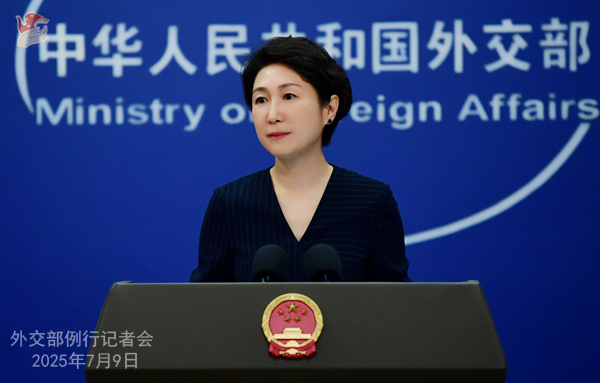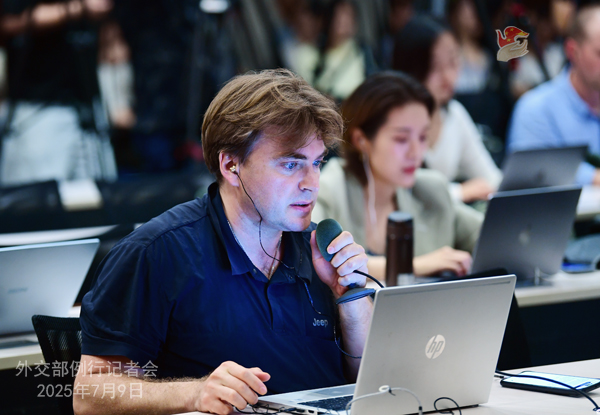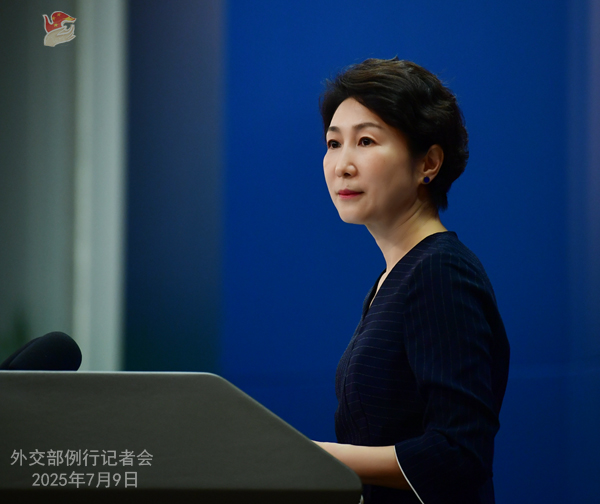
People’s Republic of China


Shenzhen TV: The 59th session of the United Nations Human Rights Council yesterday adopted the resolution proposed by China entitled “The contribution of development to the enjoyment of all human rights.” Can you further brief us on that?
Mao Ning: Yesterday, the ongoing 59th session of the United Nations Human Rights Council in Geneva, Switzerland adopted the China-proposed resolution “The contribution of development to the enjoyment of all human rights.” The resolution was adopted by consensus among all member states of the Human Rights Council, which speaks volumes about the universal recognition and extensive support from the international community.
Development and human rights are important pillars of the United Nations. The resolution reaffirms the contribution of development to the enjoyment of human rights and emphasizes the people-centered approach in realizing high-quality development and meeting people’s ever-growing needs for a better life. China hopes to work with all parties to uphold true multilateralism, strive for high-quality development, and promote and protect all human rights.
TASS: My first question is, it was reported that European Commission President Ursula von der Leyen put forward three requirements for China yesterday, including restricting cooperation with Russia. What is your comment? My second question is, U.S. President Donald Trump said that the U.S. has had a really good relationship with China lately, and China has “been very fair on our trade deal.” What is the Foreign Ministry’s comment?
Mao Ning: On your first question, cooperation between China and Russia does not target any third party, and should not be disrupted by any third party.
On your second question, China always views and handles its relations with the U.S. under the principles of mutual respect, peaceful coexistence and mutually beneficial cooperation.
Kyodo News: China will mark its National Pavilion Day on July 11 at the Osaka Expo. Which Chinese official will China send to attend the event at the China Pavilion?
Mao Ning: As I have learned, China will send a delegation to mark China’s National Pavilion Day of the Osaka Expo. Details will be released when available. Please stay tuned.
AFP: The German government said yesterday that the Chinese military employed a laser targeting a German aircraft in the Red Sea. This move endangers German personnel, which is entirely unacceptable. Germany has summoned the Chinese ambassador. What’s China’s comment?
Mao Ning: From what we have learned from the competent authorities, the information posted by Germany does not match the facts that China has gathered.
The Chinese navy’s escort missions in the Gulf of Aden and the waters off Somalia are aimed at fulfilling China’s responsibility as a major country and contribute to the safety and security of international shipping lanes. They maintain sound communication with Germany and the EU. It is important to increase communication in a timely way and be fact-based to avoid misunderstanding and miscalculation.

China News Service: We noted that according to LatAm Pulse, a survey conducted by AtlasIntel and Bloomberg, favorable opinions of China have been on the rise in the six largest Latin American economies, namely Brazil, Mexico, Argentina, Colombia, Chile and Peru. What’s your comment?
Mao Ning: I also noted the survey. It shows that trade with China benefits Latin America. China is a reliable and useful source of financing for Latin American countries, and Chinese investment in infrastructure delivers tangibly for them. The cooperation between China and Latin America is increasingly recognized and supported by Latin American people.
As President Xi Jinping said, China and Latin American and Caribbean (LAC) countries are advancing hand in hand as a community with a shared future. This community of ours is founded upon equality, powered by mutual benefit and win-win, invigorated by openness and inclusiveness, and dedicated to the people’s well-being. This is the key reason behind people’s support of China-LAC cooperation.
AFP: Today, Taiwan kicked off its annual military drills, which will, for the first time, feature newly delivered U.S. high-tech rocket systems. Taiwan said the drills are aimed at sending a message that it is capable of and confident in safeguarding its “sovereignty” and “liberal and democratic lifestyle.” What’s the Foreign Ministry’s comment?
Mao Ning: Our firm opposition to the military ties between the U.S. and Taiwan is consistent. The DPP authorities’ attempt to seek “Taiwan independence” through military buildup and soliciting foreign support will not succeed.
AFP: The U.S. government announced yesterday that the U.S. would start restricting purchases of farmland by Chinese nationals and other “foreign adversaries,” citing security concerns. What’s China’s comment?
Mao Ning: The U.S. overstretches the concept of national security and deprives the right of institutions and citizens of particular countries to purchase farmland. This is typically discriminatory and violates the principle of market economy and international trade rules, and will eventually hurt the U.S.’s own interests. We urge the U.S. to immediately stop politicizing trade and investment issues.
Bloomberg: European Commission President Ursula von der Leyen accused China of distorting trade and limiting access for European firms two weeks ahead of the summit between the economic powers. Von der Leyen said, if our partnership is to move forward, we need a genuine rebalancing, fewer market distortions, less overcapacity exported from China, and fair, reciprocal access for European businesses in China. We’re wondering if the Foreign Ministry has any comments on these remarks.
Mao Ning: China noted the reports. The EU leader spoke highly of China’s economic and social development, especially in areas of green development and poverty alleviation. We commend that. Let me reiterate that China’s development creates opportunities, not challenges, to the EU. China is the world’s most important stabilizing force and most predictable source of certainty. We hope the EU can become a reliable and predictable partner for China as well.
On the EU’s concerns on trade, let me point out that with such huge trade volume, it is only natural that China and the EU have some differences and frictions in the process of cooperation. Over the past five decades of diplomatic relations, China-EU cooperation has kept growing. Today, the size of China-EU trade per day is as large as that of a whole year when the two sides established diplomatic ties. We hope the EU will view its trade relations with China from an all-round, more objective and positive perspective, rather than amplify differences and not talk about cooperation. What the two sides can and should do is to drive trade upward and forward in a balanced way through two-way opening up, properly manage trade frictions through dialogue and consultation, and avoid letting specific issues take up the whole picture or making every trade issue about security.
The current state of China-EU trade is a result of the combined forces of the macroeconomic environment, international trade conditions and our respective industrial structure. Neither side should be asked to take the entire responsibility for it. The laws of the market should be respected. There should be no forced buying and selling. China is willing to import more quality products from the EU that meet China’s market demand. We hope the EU will ease restrictions on high-tech exports to China. The EU’s public procurement market is far from being as fair and open as the EU claims. Many hidden barriers do exist. A lot of countries have publicly criticized the EU for being partial to EU companies on large-scale procurement projects. China’s subsidy policies are fully compliant with WTO rules. They are open and transparent. China is not the only country that has subsidies. The EU should not apply double standards on this issue. According to available information, from 2021 to 2030, the EU will provide various subsidies totaling over €1.44 trillion. By 2024, over €300 billion has been distributed. Overcapacity should not be measured purely by output or export. Otherwise, shouldn’t Airbus jets and German automobiles be counted as overcapacity as well?
This year marks the 50th anniversary of China-EU diplomatic ties. It is an important year of building on past achievements and charting the future for this relationship. We hope the EU will form a more objective and rational perception of China, and practice a more positive and pragmatic China policy. We also hope the EU will see that what needs “rebalancing” is not China-EU economic ties per se, but the EU’s mindset. Given the volatilities in today’s world, we hope the EU will work with China, enhance our mutually beneficial cooperation, properly settle differences and disputes, and promote the sustained, sound and steady growth of China-EU relations.




